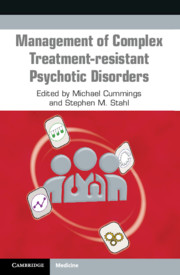Book contents
- Management of Complex Treatment-Resistant Psychotic Disorders
- Management of Complex Treatment-Resistant Psychotic Disorders
- Copyright page
- Contents
- Contributors
- Acknowledgements
- Abbreviations
- List of Icons
- Introduction
- Part I Treatment Strategies
- 1.01 Approaches to Positive Psychotic Symptoms
- 1.02 Use of Plasma Levels in Antipsychotic and Mood Stabilizer Treatment
- 1.03 Advantages of Long-Acting Injectable Antipsychotics
- 1.04 Approach to Treatment-Resistant Schizophrenia Spectrum Patients
- 1.05 Approach to Depressed or Suicidal Schizophrenia Spectrum Patients
- 1.06 Approach to Persistent Aggression and Violence in Schizophrenia Spectrum Psychotic Disorders
- 1.07 Approach to Bipolar Diathesis in Schizophrenia Spectrum Patients
- 1.08 Approach to Anxiety in Schizophrenia Spectrum Patients
- 1.09 Approach to Insomnia and Sleep Disturbance in Schizophrenia Spectrum Disorders
- 1.10 Approach to Psychosis in Children and Adolescents
- 1.11 Electroconvulsive Therapy and Other Non-Pharmacological Treatments
- 1.12 Approach to Substance Use Disorders in Schizophrenia Spectrum Disorders
- 1.13 Approaches to Behavioral Disturbances in Dementia and Traumatic Brain Injury Patients
- Part II Medication Reference Tables
- Appendices
- Index
- References
1.01 - Approaches to Positive Psychotic Symptoms
from Part I - Treatment Strategies
Published online by Cambridge University Press: 19 October 2021
- Management of Complex Treatment-Resistant Psychotic Disorders
- Management of Complex Treatment-Resistant Psychotic Disorders
- Copyright page
- Contents
- Contributors
- Acknowledgements
- Abbreviations
- List of Icons
- Introduction
- Part I Treatment Strategies
- 1.01 Approaches to Positive Psychotic Symptoms
- 1.02 Use of Plasma Levels in Antipsychotic and Mood Stabilizer Treatment
- 1.03 Advantages of Long-Acting Injectable Antipsychotics
- 1.04 Approach to Treatment-Resistant Schizophrenia Spectrum Patients
- 1.05 Approach to Depressed or Suicidal Schizophrenia Spectrum Patients
- 1.06 Approach to Persistent Aggression and Violence in Schizophrenia Spectrum Psychotic Disorders
- 1.07 Approach to Bipolar Diathesis in Schizophrenia Spectrum Patients
- 1.08 Approach to Anxiety in Schizophrenia Spectrum Patients
- 1.09 Approach to Insomnia and Sleep Disturbance in Schizophrenia Spectrum Disorders
- 1.10 Approach to Psychosis in Children and Adolescents
- 1.11 Electroconvulsive Therapy and Other Non-Pharmacological Treatments
- 1.12 Approach to Substance Use Disorders in Schizophrenia Spectrum Disorders
- 1.13 Approaches to Behavioral Disturbances in Dementia and Traumatic Brain Injury Patients
- Part II Medication Reference Tables
- Appendices
- Index
- References
Summary
In community settings, the most common barriers to independent living, employment, and stable interpersonal relationships for patients suffering from schizophrenia-spectrum disorders or other psychotic disorders are negative symptoms and cognitive deficits [1]. In contrast, severely mentally ill individuals, often incarcerated or chronically institutionalized, more frequently experience substantial barriers related to positive psychotic symptoms leading to problematic behaviors such as aggression or violence [2]. This is not to say that among the chronically institutionalized severely mentally ill population that positive psychotic symptoms are the only, or even majority, source of problematic behaviors. A survey conducted within the California Department of State Hospitals, a circa 7000-bed system dedicated to the treatment of conserved and forensically committed patients, reviewed 839 episodes of aggression or violence by 88 persistently aggressive inpatients and found that 54% of such episodes were impulsive, 39% were predatory or instrumental, and 17% were psychotically driven [3]. Nevertheless, amelioration or control of positive psychotic symptoms commonly forms the initial treatment focus among the severely mentally ill [4].
- Type
- Chapter
- Information
- Publisher: Cambridge University PressPrint publication year: 2021

